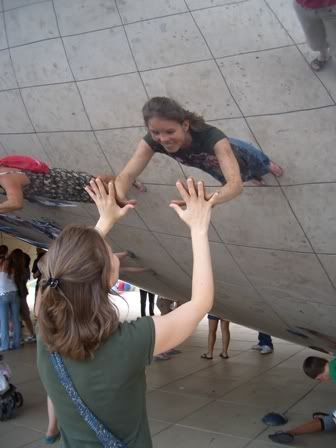Writing Influences
Of course, there are thousands and thousands of influences--more than I know. From growing up on Anne of Green Gables and Nancy Drew and Janette Oke to digging in to Austen and Dickens to discovering new loves like Anne Tyler and Richard Russo and Lisa Samson. From practicing piano and flute to studying the symphony to poring over Kierkegaard.
But there are two things that I keep in the front of my mind:
1. One dance scene from a musical of which I can't remember the title, and
2. Hebrew poetry.
First, the musical: I remember the musical not being all that great. One song from it frequently gets stuck in my head, rather one line from one song. Some musicals resemble a two-term presidency: the first act too wrapped up in impressing you that it comes off on the idiotic side and the second act concerning itself with the story. This musical was the same. The second act was good. I could've done without the first.
Nonetheless, this one scene captured me. To set the stage: three sisters come home after the death of their mother and rediscover themselves and each other (we've seen it before). They grew up dancing together, and in this one scene, the youngest sister resurrects a dancing song. I don't remember the details, but she had to call out the steps and moves to her older sister (step, ball, change sort of thing). During the dance, the sisters get into more and more of a heart-felt, serious talk, all the meantime puncuated by "step, ball, change." I loved it. I loved how something everyday acted as an ostinato during their heart-to-heart. It both added to the tension but also kept it from being maudlin.
I want this in my writing. Life intersects. Kids don't stop fighting over the Batman toy just because your best friend called in tears. It meshes together.
Second, the Hebrew poetry. Two things in particular: metonymy and symbolic parallelism. Metonymy is a figure of speech where a word or phrase is substituted with another associated with it. It's saying "The White House said" rather than "The President said." It's claiming that "the hand of God was upon him" rather than "He acted with God's power." Sometimes it's taking a piece of something to represent the whole, or the whole to represent just a piece. I could give you thousands of examples, illustrations sometimes beautiful, sometimes shocking.
I want this in my writing. Pieces substituting for a whole. A grown woman crying because she lost her favorite stuffed animal as a child when really she's grieving her lost innocence.
And symbolic parallelism. Two lines in Hebrew poetry, both metaphors, usually, that echo the same thought.
In other words, my lists.
I love my lists. I can't resist them. Like in the beginning of my book about a single mom:
One of these days I’ll be able to say “single mother” without retching or having visions of Craig’s death, one where he falls out of a boat at Lake Wallenpaupack and gets caught in the propellers, one where he gets lost skiing in the Poconos and eventually gets eaten by wolves, and one where he gets poisoned by one of the hers when she discovers another of the hers.Lists of painful and untimely deaths.
Reading Hebrew poetry my whole life, is it any wonder I love metaphors?




1 comment:
A few thoughts...
1) you grew up reading Hebrew poetry??
2) Thanks for the explanations of some things for which I'm not acquainted. It sounds like an engaging way to craft your prose.
3) How much do I love having read your excerpt BEFORE this post? I WANT TO READ MORE, DAGGUM IT! :)
Post a Comment